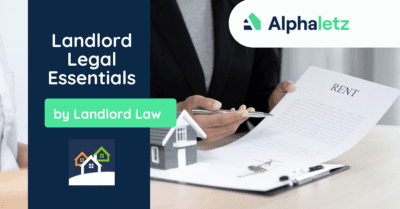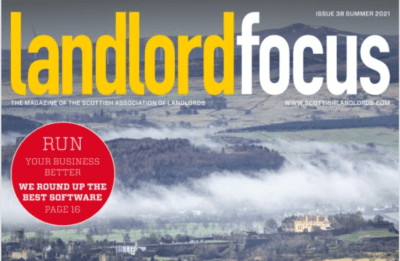Article by GoSimpleTax in conjunction with Alphaletz

Alphaletz and GoSimpleTax are delighted to bring you a series of articles sharing tax information to landlords. This second blog provides a guide to self-assessments for landlords.
If you make money from renting out your property to others, HM Revenue and Customs (HMRC) considers you as a landlord, even if you don’t think you are. As such, you’ll need to fill in an annual Self-Assessment tax return form (which tells HMRC how much Income Tax you’ll owe on your earnings) and submit it before the 31st January deadline.
At first, this process may seem daunting, especially given how many changes there have been in property tax over the last few years. But, according to friends of the BLA GoSimpleTax, there are several ways to make this process a walk in the park and they have supplied a guide to Self-Assessment tax returns for landlords below…
What tax do landlords need to pay?
Landlords must pay Income Tax on any profits made from their rental property. The amount of tax you pay will depend on your total taxable income. At present, the standard Personal Allowance is £12,500, meaning you do not have to start paying tax until you earn £12,501. However, you do not get a Personal Allowance on taxable income exceeding £125,000.
If you pay Income Tax at the basic rate (that is, your taxable income is between £12,501 and £50,000), you will have to pay 20% of it in tax, while higher rate taxpayers with income between £50,001 and £150,000 will have to pay 40%. If you earn more than £150,000 per tax year, you will have to pay Income Tax at the additional rate of 45%.
Please bear in mind that tax laws change, and it is important that you keep abreast of these.
Are there any other allowances?
Back in 2017, the government announced a new property allowance for property income. This is a tax exemption of up to £1,000 per tax year for landlords and individuals with income from land or property. If your income from property rental is between £1,000 and £2,500, you must contact HMRC.
You must also report it on a Self-Assessment tax return if your income from property rental is:
- Between £2,500 and £9,999 after allowable expenses
- £10,000 or more before allowable expenses
Changes to mortgage interest tax relief
Since April 2017, tax relief for mortgage interest and finance costs for higher-rate taxpayers have gradually been phased out through a 25% year-on-year reduction for four years. This means that, by 2021, landlords will get tax relief on these costs at the basic rate of 20%.
That means that, as of 2021, 100% of your mortgage interest payments will be covered by this new 20% tax relief. You can find out more here.
How the Self-Assessment tax return process works
The Self-Assessment is a tax system that is used by HMRC to collect Income Tax from taxpayers.
There are two ways to file a tax return: online, or by downloading, filling in and sending a paper tax return form. HMRC will then calculate how much Income Tax you owe based on the income and expenditure you’ve reported.
To simplify matters, many landlords opt to use Self-Assessment tax software to smoothly and accurately complete their tax returns.
The key dates throughout the tax year
As a landlord, there are some key dates that you must keep in mind throughout the tax year.
To submit your Self-Assessment tax return, you must be registered with HMRC by the 5th October following the end of the tax year. If you have rental income in the tax year ending 5th April 2021, for example, you will need to register as a landlord with HMRC by 5th October 2021.
The deadline for your online tax return would then be midnight on the 31st January 2022. If you would rather file a paper tax return, you must send it to HMRC by midnight on the 31st October 2021. You’d then pay any tax you owe on 31st January 2022 – regardless of the method you used to file.
HMRC will charge an automatic £100 fine if you fail to file your Self-Assessment tax return on time. You will have to pay more if it is later and you will also be charged interest on any late payments to HMRC. You can calculate your estimated penalty for late Self-Assessment tax returns and payments here.
You may also need to make an advance payment towards your next Self-Assessment tax bill (known as a payment on account) on the 31st January. You may also need to make a second payment on account on the 31st July.
Allowable expenses for landlords
As a landlord, you can deduct allowable expenses from your rental income once you work out your taxable rental profit. Your allowable expenses must be wholly and exclusively for the purpose of your rental property business. In other words, if an expense was not incurred for the property, you cannot deduct the cost from your rental income.
There are several types of expenses that you can deduct, including:
- Water rates, gas, electricity and council tax
- General maintenance and repairs to the property – improvements are not included
- Insurance – including contents, policies for buildings and public liability
- Cost of services that are part of the rental agreement, such as cleaners and gardeners
If you use your own car to visit and manage the property, you can also claim a flat rate of 45p per mile for the first 10,000 miles in the tax year. This rate is not affected by the number of vehicles used.
In order to take advantage of these allowable expenses, you must keep accurate records so that you can submit evidence of them should HMRC ask for it.
This is yet another reason why getting organised ahead of time is so crucial. If you keep your Self-Assessment tax return updated in real time (i.e. you update it with your income and expenditure information as soon as you receive it), then you have more time to look back over your receipts and determine whether they are allowable expenses.
Done right, the Self-Assessment tax return process can be simple, and it can also help you make tax savings.
It’s worth noting that within the Alphaletz app, you are able to track capital and on-going expenses separately. You can create an instant report showing your year’s income, expenses, and profit for any property, or for your entire business. Alphaletz pulls the figures together in the exact format that accountants need, so you can prepare tax returns in half the time.


